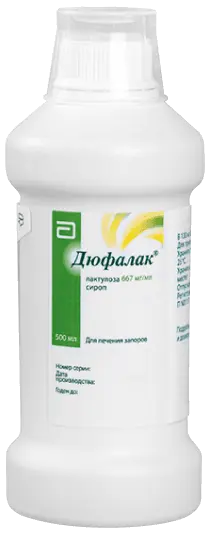Description
Dufalac Pharmacodynamics
It has a hyperosmotic laxative effect, stimulates intestinal peristalsis, improves absorption of phosphates and Ca2+ salts, promotes excretion of ammonium ions.
Lactulose is broken down by the intestinal flora of the large intestine into low-molecular organic acids, which leads to a decrease in pH and an increase in osmotic pressure and, consequently, an increase in the volume of intestinal contents. These effects stimulate intestinal peristalsis and influence the consistency of the stool. As a result, the physiological rhythm of emptying the large intestine is restored.
In hepatic encephalopathy, the effect is attributed to suppression of proteolytic bacteria by increasing the number of acidophilic bacteria (such as lactobacilli), conversion of ammonia into an ionic form by acidifying the contents of the colon, emptying the bowel due to lower pH in the colon and osmotic effect, and reducing nitrogenous toxic substances by stimulating bacteria that utilize ammonia for bacterial protein synthesis.
Lactulose as a prebiotic enhances the growth of beneficial bacteria such as bifidobacteria and lactobacilli, while inhibiting the growth of potentially pathogenic bacteria such as Clostridium and Escherichia coli, resulting in a more favorable balance of intestinal flora.
Indications
– Constipation: regulation of the physiological rhythm of colon emptying;
– Stool softening for medical purposes (hemorrhoids, conditions after colon and anal surgery);
– Liver encephalopathy: treatment and prevention of hepatic coma or precoma
Contraindications
– galactosemia;
– obstruction, perforation or risk of gastrointestinal perforation;
– Hypersensitivity to any component of the drug;
– galactose or fructose intolerance, lactase deficiency or glucose-galactose malabsorption.
With caution:
– Rectal bleeding undiagnosed;
– colostomy, ileostoma.
Dosage and administration
- The drug is intended for oral administration as well as for rectal administration.
- Lactulose solution can be taken both diluted and undiluted.
- All dosages should be selected individually.
- A single dose taken should be swallowed immediately, without retaining it in the mouth.
- If a single daily dose is prescribed, it should be taken at the same time, for example, during breakfast.
- During therapy with laxatives, it is recommended to take a sufficient amount of fluid (1.5-2 liters, which equals 6-8 glasses) per day.
- For accurate dosing of the drug in bottles, use the included measuring cup.
- When using the drug in sachets, tear off a corner of the sachet and immediately take the contents.
- Dosage for treating constipation or for softening stools for medicinal purposes
- The daily dose of lactulose may be taken as a single dose or divided in two using a measuring cup.
- After a few days, the initial dose may be adjusted to a maintenance dose depending on the response to the drug intake. The laxative effect may appear 2-3 days after starting to take the drug.
- Age
Adults and adolescents
Initial daily dose
15-45 ml (1-3 sachets)
Maintenance daily dose
15-30 ml (1-2 sachets) - Age
Children 7-14 years old
Starting daily dose
15 ml (1 sachet)
Maintenance Daily Dose
10-15 ml (1 sachet*) - Age
Children 1-6 years old
Starting daily dose
5-10 ml
Maintenance Daily Dose
5-10 ml - Age
Children under 1 year of age
Initial daily dose
Up to 5 ml
Maintenance Daily Dose
Up to 5 ml
*If maintenance daily dose is less than 15 ml, it is recommended to use the drug in vials. - For accurate dosing in children under 7 years of age it is recommended to use the drug in vials.
- Dosage in the treatment of hepatic encephalopathy (adults)
For oral administration:
Initial dose: 3-4 times a day in 30-45 ml (2-3 sachets).
Then switch to individually selected maintenance dose so that soft stools are taken maximum 2-3 times a day.
For rectal administration:
In the case of precoma or coma, the drug may be administered as a holding enema (300 ml of drug/700 ml of water). The enema should be held for 30-60 minutes, the procedure should be repeated every 4-6 hours until the drug can be administered orally. The safety and efficacy of using the drug in children (under 18 years) with hepatic encephalopathy has not been established due to lack of data. - Patients of elderly age and patients with renal or hepatic insufficiency
There are no specific recommendations on dosing, since the systemic effect of lactulose is insignificant.





